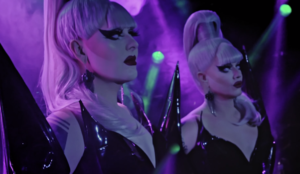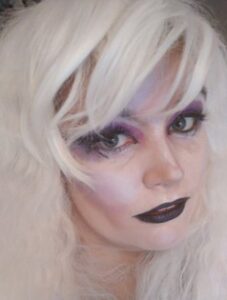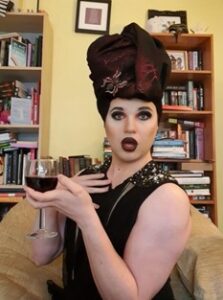Dr Rosie Fox and Dr James Greenwood-Reeves, University of Leeds
R.Fox@leeds.ac.uk; J.R.H.Greenwood@leeds.ac.uk

“Still from Dragula TV show” by The Boulet Brothers is licensed under CC BY-SA 4.0.
We are obsessed with drag and the law. In our SLSA conference paper in 2021, our drag alter egos Mercy Killing and Alice Aforethought demonstrated how law is integral to RuPaul’s Drag Race both latently and expressly. Latently, the show reproduces forms of Western legal culture structurally: it replicates aspects of a legal system through the framework of the reality competition, its rules and regulations, the appeal of the contestants through a ‘lip sync for your life’, and the role of RuPaul as judge, jury, and executioner. Expressly, during certain challenges (whether the “Justice in Drag” mini-challenge, or the “Jersey Justice” sketches), law is performed and its aesthetics and culture are reproduced, often (per Butler’s analysis of drag) in parody, throughout the series.
More broadly, wider jurisprudential concepts such as fairness, justice, and equality are stipulated as core values in RPDR. Liberty is a recurring motif: freedom to live, love, and perform as one’s truest self. Likewise, equality is extolled as a central tenet: RPDR celebrates equality through diversity, with challenges such as S4E6’ “Pride Floats” highlighting the queer (or more specifically, gay) liberation to which the show aspires. These socio-legal concepts are adopted, manipulated and reproduced – themselves queered, or as we call it, “dragged up” – in a way which both reinforces and transforms those legal concepts.
However, this dragging-up of law is neither entirely beneficial nor fully transformative. While promulgating normative values of liberty and Americana, and making broad claims about inclusivity and equality, the show reinforces narratives of neoliberal individualism. Performers are encouraged to focus on themselves, to compete for money, to establish themselves as a brand, and so forth. Furthermore, RPDR largely reinforces standards of beauty which are gendered, patriarchal, and elitist through placing a premium on “realness” – thereby essentialising further that which is considered desirably feminine. Fans critiquing the show’s judging have regularly pointed out the bias in favour of drag artists who are white, thin, and ‘fishy’ (a problematic term on its own), and who are conventionally attractive in and out of drag. We see parallels to neoliberal conceptions of law, justice, and the liberal legal subject through the favourable treatment given to some performers over others. While claiming to operate under a liberating, formal equality, RPDR fails to acknowledge and address structural inequalities which the show itself perpetuates.
At the 2022 SLSA conference in York, we discussed how although Dragula is not explicitly focused on adjudication or justice, the show provides inspiration for new means of thinking about these concepts beyond standard Western conceptions and structures. A horror-oriented drag performance show, Dragula celebrates performers who transgress what is considered “normal” in drag culture, encouraging them to express themselves in unique and unconventional ways: dressing as ghosts, drinking blood, or performing a live alien birth onstage. As Gadelha et al have explored elsewhere, Dragula more actively subverts social norms than RPDR, particularly through its tenets of Horror and Filth, which it requires its contestants to observe, embody, and perform. Dragula celebrates depravity and the “outsider.” As such, a form of counter-normativity is built into its design: not just through its queerness, but its delight in revulsion.
Dragula also presents new ways of thinking about the processes of law, structurally. It is judged by two host performers, the Boulet Brothers, which creates a very different dynamic to RPDR’s almost tyrannical approach (“I’ve consulted with the judges, but the final decision is mine to make.”). This presents fascinating challenges to standard conceptions of adjudication, including when the Boulets cannot agree but must instead make a judgment through compromise. Such inter-adjudicator conflict led to one interesting scenario where a contestant thereby simultaneously won a challenge, and was marked for extermination. By breaking both the zero-sum and winner-takes-all paradigms of Western adjudication, Dragula provides opportunities for us, as lawyers and academics, to imagine other possible legal realities.
Finally, Dragula inspires new means of pursuing justice by challenging traditional ideas about gender, sexuality, and identity. The show features performers who are non-binary, trans, or gender non-conforming (more prominently than RPDR), and encourages them to express their identities through drag. This authenticity and acceptance motivates thinking about social justice that prioritises the rights and needs of marginalised communities, and recognises the importance of identity and self-expression in achieving a more radical equality.
Both shows provide opportunities to explore themes of law, fairness, and justice outside of the confines of traditional legal or academic parameters. Yet they are both inevitably still limited in being reality television competitions, ultimately reinforcing a neoliberal paradigm of individual performers competing against each other. They also both position their hosts and contestants as being superior performers, and can have distorting effects on the market in the drag scene, with their stars mopping up gigs that would otherwise go to local talent. To paraphrase Aleardo Zanghellini, talking about the limitations of queerness itself, these shows cannot be “counternormative all the way down.”
So let’s go further. The best way of seeing what drag can teach us about law comes not from looking at reality television, but by looking at drag in its real lived environment. Local drag artists can provide unique perspectives on law and justice through their performances and experiences. Their working lives intersect with law in many invisibilised ways: non-consensual touching in clubs, policing and private security, precarious employment, and so much more besides. Their performances and activism can shed light on issues including, but not limited to, discrimination, hate crimes, and LGBTQ+ rights. Many drag artists have a deep understanding of the historical context surrounding LGBTQ+ rights and activism. They are likely to have experienced discrimination or injustice firsthand, and their stories offer important insights into how injustice is experienced within marginalised communities. They can also help build solidarity and support within these communities, for example, through events such as Queen Bee in our city, which showcased local drag artists and raised money for charity, whilst celebrating the life of much loved members of Leeds’ LGBTQ+ community.
And so, this is where we are now. As much as we love reality television drag shows, there is a limit to what we can learn and what we can usefully do to make a positive impact in the drag world by solely studying popular culture. We want to go further and do more. We want to work with local drag performers in the UK, to build a meaningful and cooperative network to learn from and support drag artists, and to explore more about the exciting intersections between drag, art, and the law. We are working hard on developing methodology for this research that centres and empowers drag artists as collaborators on, rather than subjects of, research, and creating something that is meaningful, important, and promotes social justice for all involved. If this is something you’re interested in, get in touch!

Mercy Killing, last seen April 2021

Alice Aforethought, missing since April 2021

Interesting blog thanks. You obviously have a very positive view of drag and consider its benefits to several groups but women are a notable omission. There is an argument that drag is just sexist (you allude to the problems with terms such as ‘fishy’) but don’t engage with this
Thanks for your comment Hannah. Some drag acts are misogynistic – due to the word count limitation on the blog we weren’t able to delve more into the ‘fishy’ issue but there have been AFAB drag performers who have commented on this (Victoria Scone and Hollow Eve). Arguably, most drag acts are not misogynistic. Many drag artists cite their admiration and respect for the powerful women in their lives as a source of strength and inspiration (eg: Shea Coulee, Eureka, Vanessa Vanjie Mateo). Drag can be liberating and a tool for deconstruction – Not least when we consider drag kings (eg: Landon Cider, Tenderoni, and Leeds’ own King Little), genderfluid and nonbinary drag performers (eg: Jinkx Monsoon, Maxi Glamour, Bob the Drag Queen, Davina de Campo, Hollow Eve), and AFAB queens (Victoria Scone, Creme Fatale) – from James and Rosie